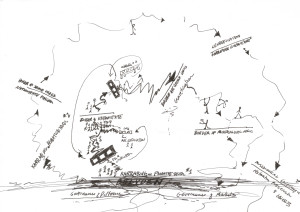
Object Positions Public Lecture 6 | The Aesthetic Mark and the Cultic Difference: A Reply of the Karrabing Film Collective with Elizabeth A. Povinelli
, –
Monday 30 October
6:30-8:30pm
Booking required, tickets available for £3 here
Followed by a conversation with Karen Salt
“It is hard to think of a more exhausted question than ‘What is the aesthetic?’, or ‘What makes an art object an aesthetic object?’ Fortunately we left behind these metaphysical questions long ago. We now ask, ‘What does art do? What can it do?’ Of course, no one is so naïve as to think that art resists commodification in and of itself; or that the percepts and truth-functions of art need be progressive. The ready-made now often means ‘ready-made for the market’ or ‘ready-made for maximal investment and profitability’. Indeed, the Politics of Art in the Age of Speculation has sent cold shivers across segments of the art world. And what surprise, given the role that art and artists have played in critical theory. Deleuze and Badiou may not have agreed about much, but they both single out art as a key mode of thought and truth-procedure. And at the centre of debates between Benjamin and Adorno was an agreement that for art to play these roles in Western truth and thought it must first liberate itself from ‘an imaginary historical horizon’. The celebrated freedom and the autonomy of the artist, curator, and art were achieved in lockstep with the broader Western struggle for human and social freedom and autonomy from the cultish. Art became possible when the image was historically distanced from the cult, theology, and tribalism; and it is threatened by a shift into commodity fetishism and fascism.
Given the fundamental relationship between critical theory and the cultish, what is the ‘mark of the aesthetic’ or the ‘aesthetic mark’ in the practice of the Karrabing Film Collective, a primarily Indigenous family-based art collective rooted in the northwest coastal region of the top end of Australia? How do the artworks of the Collective confront, or more moderately, comment on the historical fiction that has grounded aesthetic difference and artistic heroism - namely, that the emergence of art depended on the foreclosure of the cultic - and reciprocally that the threat to art is its divergence into new forms of cultism such as commodity fetishism and fascism?”
— Elizabeth A. Povinelli
Elizabeth A. Povinelli is Franz Boas Professor of Anthropology & Gender Studies at Columbia and one of the founding members of the Karrabing Film Collective. Her extensive writings on late liberal settler governance seek to provide a theoretical ground for existential otherwise.
Karen Salt co-Directs the Centre for Research in Race and Rights at the University of Nottingham where she works on race, trust, power and sovereignty. A significant portion of her work investigates how black nation-states and global minority communities fight for their continued sovereignty in a highly racialised world. Salt frequently engages with students, collaborates with community ogranisations and advises governmental bodies on aspects of power and social justice.
This is the sixth lecture in the Object Positions Public Lecture series led by curatorial fellow Teresa Cisneros. Object Positions is a year long programme of conversations, workshops, research and events exploring decolonial processes, colonial administrations and cultural equity.